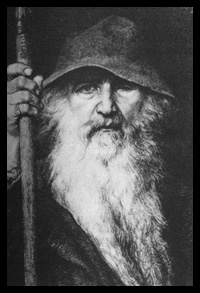 Odin or, depending upon the dialect Woden or Wotan, was the Father of all the Gods and men. Odin is pictured either wearing a winged helm or a floppy hat, and a blue-grey cloak. He can travel to any realm within the 9 Nordic worlds. His two ravens, Huginn and Munin (Thought and Memory) fly over the world daily and return to tell him everything that has happened in Midgard. He is a God of magick, wisdom, wit, and learning. In later times, he was associated with war and bloodshed from the Viking perspective, although in earlier times, no such association was present. If anything, the wars fought by Odin exist strictly upon the Mental plane of awareness; appropriate for that of such a mentally polarized God. He is both the shaper of Wyrd and the bender of Orlog; again, a task only possible through the power of Mental thought and impress. It is he who sacrifices an eye at the well of Mimir to gain inner wisdom, and later hangs himself upon the World Tree Yggdrasil to gain the knowledge and power of the Runes. All of his actions are related to knowledge, wisdom, and the dissemination of ideas and concepts to help Mankind.
Odin or, depending upon the dialect Woden or Wotan, was the Father of all the Gods and men. Odin is pictured either wearing a winged helm or a floppy hat, and a blue-grey cloak. He can travel to any realm within the 9 Nordic worlds. His two ravens, Huginn and Munin (Thought and Memory) fly over the world daily and return to tell him everything that has happened in Midgard. He is a God of magick, wisdom, wit, and learning. In later times, he was associated with war and bloodshed from the Viking perspective, although in earlier times, no such association was present. If anything, the wars fought by Odin exist strictly upon the Mental plane of awareness; appropriate for that of such a mentally polarized God. He is both the shaper of Wyrd and the bender of Orlog; again, a task only possible through the power of Mental thought and impress. It is he who sacrifices an eye at the well of Mimir to gain inner wisdom, and later hangs himself upon the World Tree Yggdrasil to gain the knowledge and power of the Runes. All of his actions are related to knowledge, wisdom, and the dissemination of ideas and concepts to help Mankind.
Odin can make the dead speak in order to question the wisest amongst them. His hall in Asgard is Valaskjalf (“shelf of the slain”) where his throne Hlidskjalf is located. From this throne he observes all that happens in the nine worlds. He also resides in Valhalla, where the slain warriors are taken.
Odin’s attributes are the spear Gungnir, which never misses its target, the ring Draupnir, from which every ninth night eight new rings appear, and his eight-footed steed Sleipnir. He is accompanied by the wolves Freki and Geri, to whom he gives his food for he himself consumes nothing but wine. Odin has only one eye, which blazes like the sun. His other eye he traded for a drink from the Well of Wisdom, and gained immense knowledge. On the day of the final battle, Odin will be killed by the wolf Fenrir.
Just as a point of curiosity: in no other pantheon is the head Deity also the God of Thought and Logic. It’s interesting to note that the Norse people set such a great importance upon logic. The day Wednesday (Wodensdaeg) is named for him.
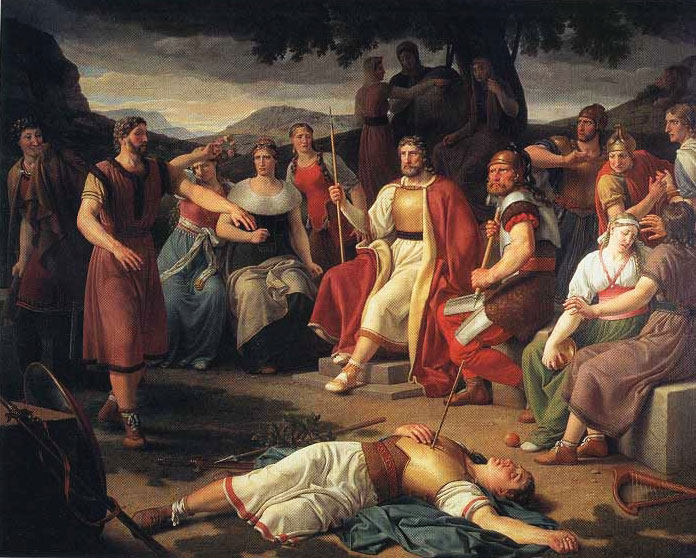

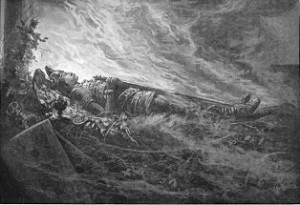 THE GOD MOANED.
THE GOD MOANED.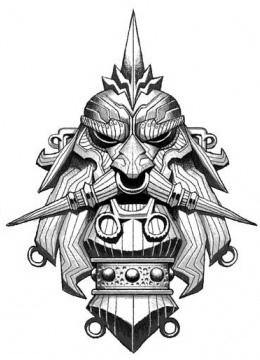 HRAUDUNG, KING OF THE GOTHS, had two sons, Agnar and Geirrod. One day when Agnar was ten winters old and Geirrod eight, the brothers gathered their tackle and went out rowing in the hope of landing some fish. But soon the wind began to bluster, and the boys were driven so far out to sea that they lost sight of land. The night-shadow grew long, and in the darkness the small boat tossed and spun and was smashed to pieces on a rocky shore. Standing bedraggled in the darkness, with waves breaking around them, Agnar and Geirrod had not the least idea where they were.
HRAUDUNG, KING OF THE GOTHS, had two sons, Agnar and Geirrod. One day when Agnar was ten winters old and Geirrod eight, the brothers gathered their tackle and went out rowing in the hope of landing some fish. But soon the wind began to bluster, and the boys were driven so far out to sea that they lost sight of land. The night-shadow grew long, and in the darkness the small boat tossed and spun and was smashed to pieces on a rocky shore. Standing bedraggled in the darkness, with waves breaking around them, Agnar and Geirrod had not the least idea where they were.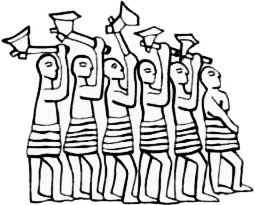 Long after the Golden Age, it was still very early in the cycle of time. And long after the war between the Aesir and the Vanir, the wall around Asgard that the Vanir had razed with their battle-magic remained a ring of rubble, deserted, the home of eagles and ravens.
Long after the Golden Age, it was still very early in the cycle of time. And long after the war between the Aesir and the Vanir, the wall around Asgard that the Vanir had razed with their battle-magic remained a ring of rubble, deserted, the home of eagles and ravens.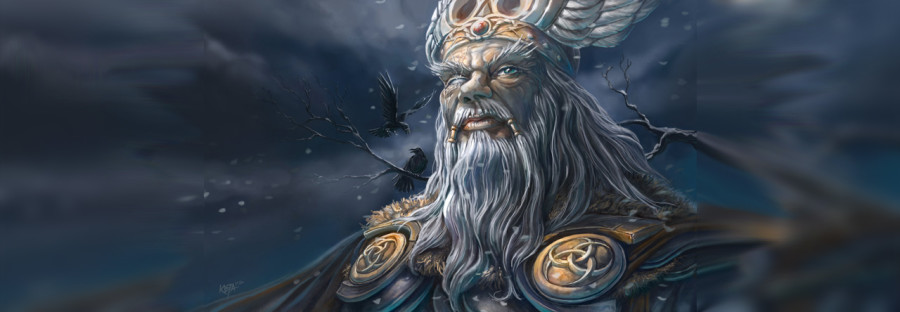
 Odin or, depending upon the dialect Woden or Wotan, was the Father of all the Gods and men. Odin is pictured either wearing a winged helm or a floppy hat, and a blue-grey cloak. He can travel to any realm within the 9 Nordic worlds. His two ravens, Huginn and Munin (Thought and Memory) fly over the world daily and return to tell him everything that has happened in Midgard. He is a God of magick, wisdom, wit, and learning. In later times, he was associated with war and bloodshed from the Viking perspective, although in earlier times, no such association was present. If anything, the wars fought by Odin exist strictly upon the Mental plane of awareness; appropriate for that of such a mentally polarized God. He is both the shaper of Wyrd and the bender of Orlog; again, a task only possible through the power of Mental thought and impress. It is he who sacrifices an eye at the well of Mimir to gain inner wisdom, and later hangs himself upon the World Tree Yggdrasil to gain the knowledge and power of the Runes. All of his actions are related to knowledge, wisdom, and the dissemination of ideas and concepts to help Mankind.
Odin or, depending upon the dialect Woden or Wotan, was the Father of all the Gods and men. Odin is pictured either wearing a winged helm or a floppy hat, and a blue-grey cloak. He can travel to any realm within the 9 Nordic worlds. His two ravens, Huginn and Munin (Thought and Memory) fly over the world daily and return to tell him everything that has happened in Midgard. He is a God of magick, wisdom, wit, and learning. In later times, he was associated with war and bloodshed from the Viking perspective, although in earlier times, no such association was present. If anything, the wars fought by Odin exist strictly upon the Mental plane of awareness; appropriate for that of such a mentally polarized God. He is both the shaper of Wyrd and the bender of Orlog; again, a task only possible through the power of Mental thought and impress. It is he who sacrifices an eye at the well of Mimir to gain inner wisdom, and later hangs himself upon the World Tree Yggdrasil to gain the knowledge and power of the Runes. All of his actions are related to knowledge, wisdom, and the dissemination of ideas and concepts to help Mankind.